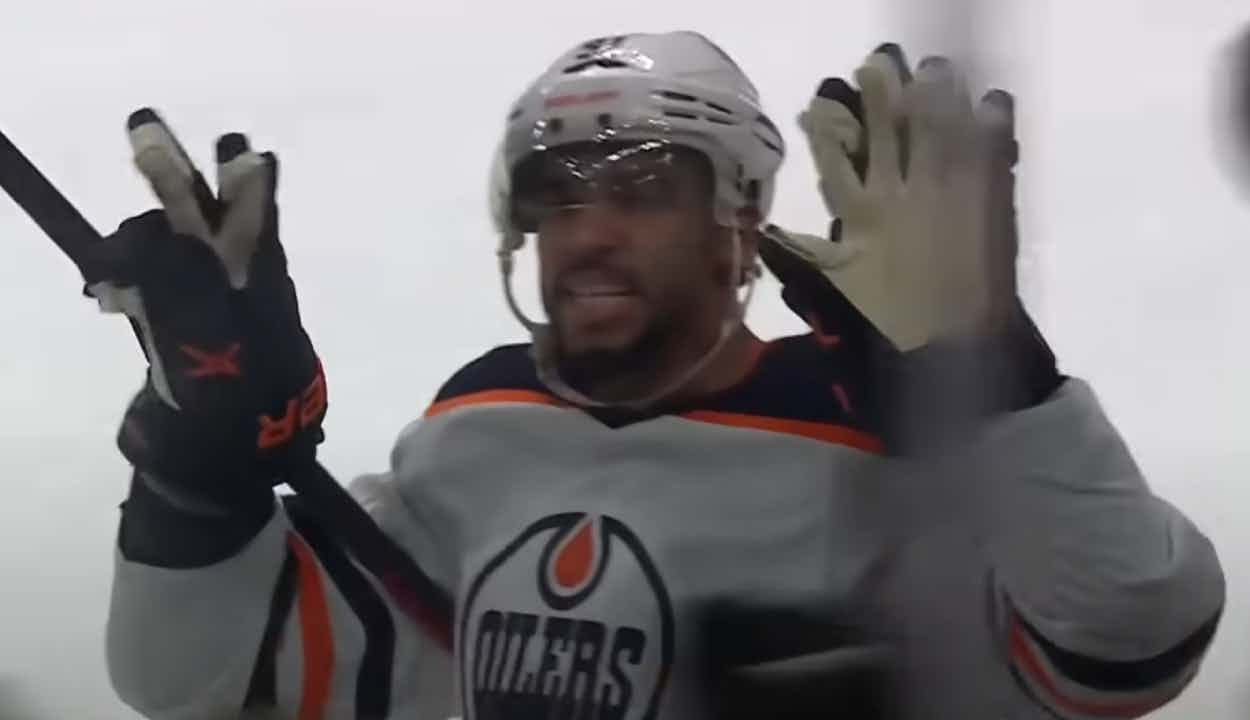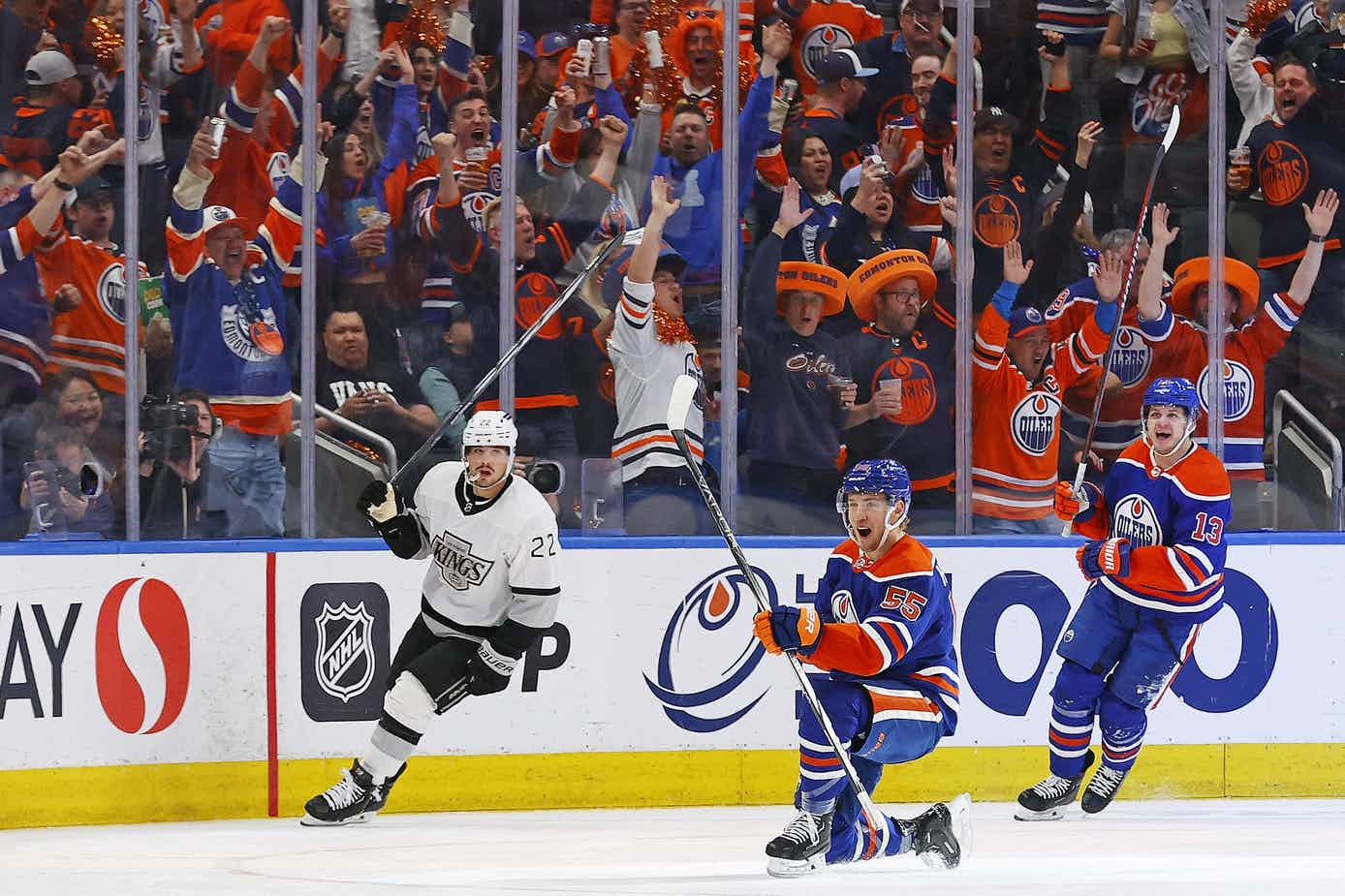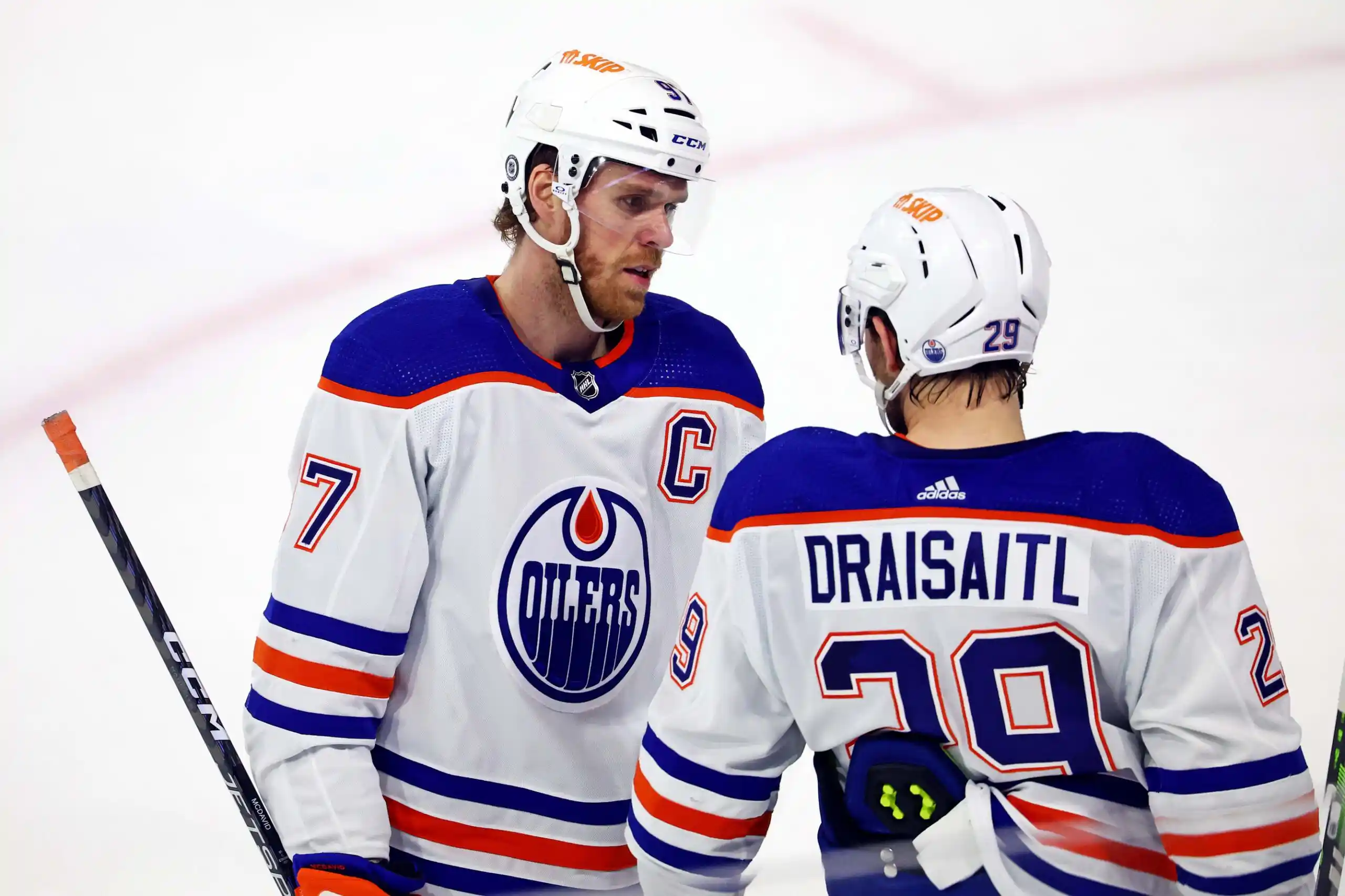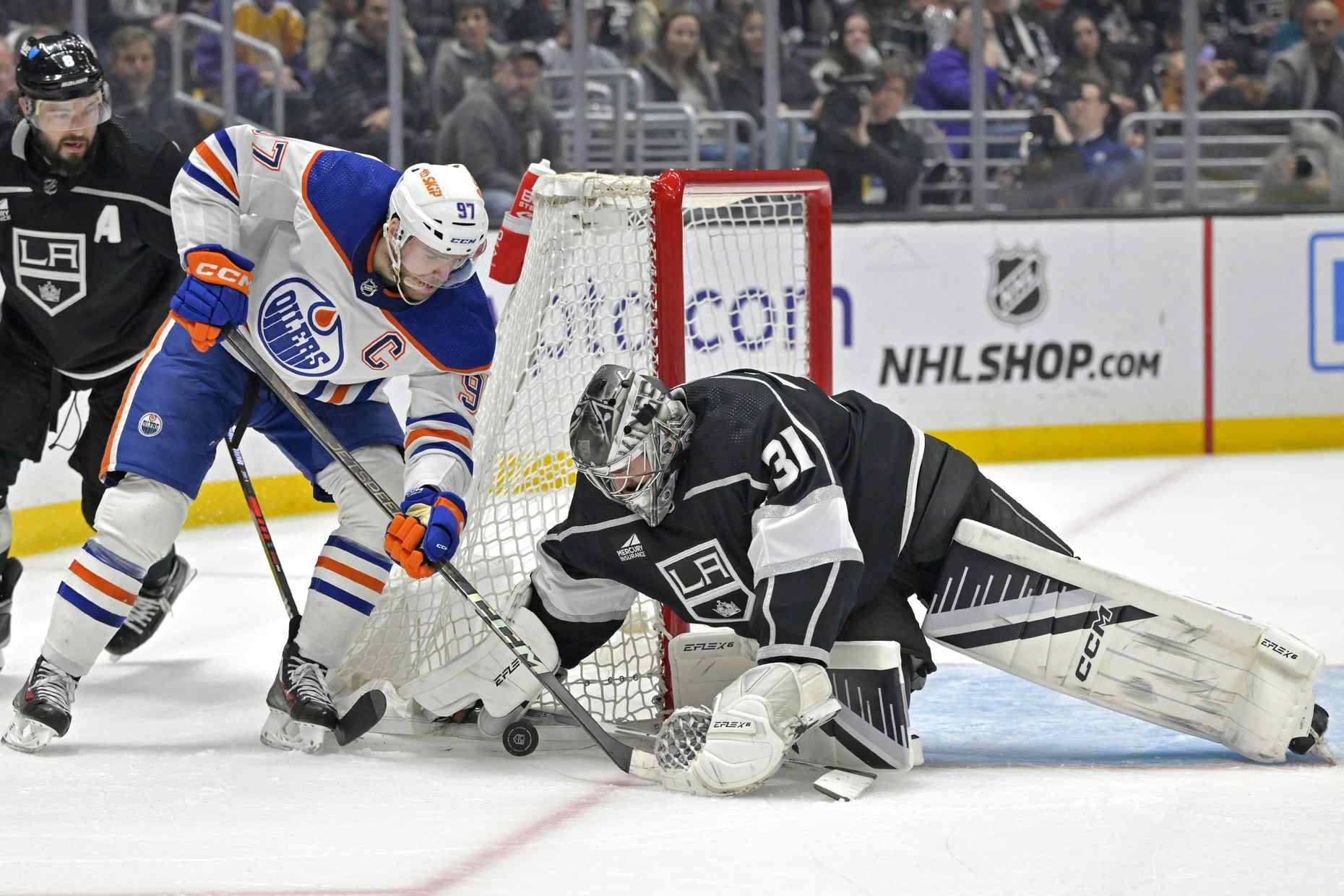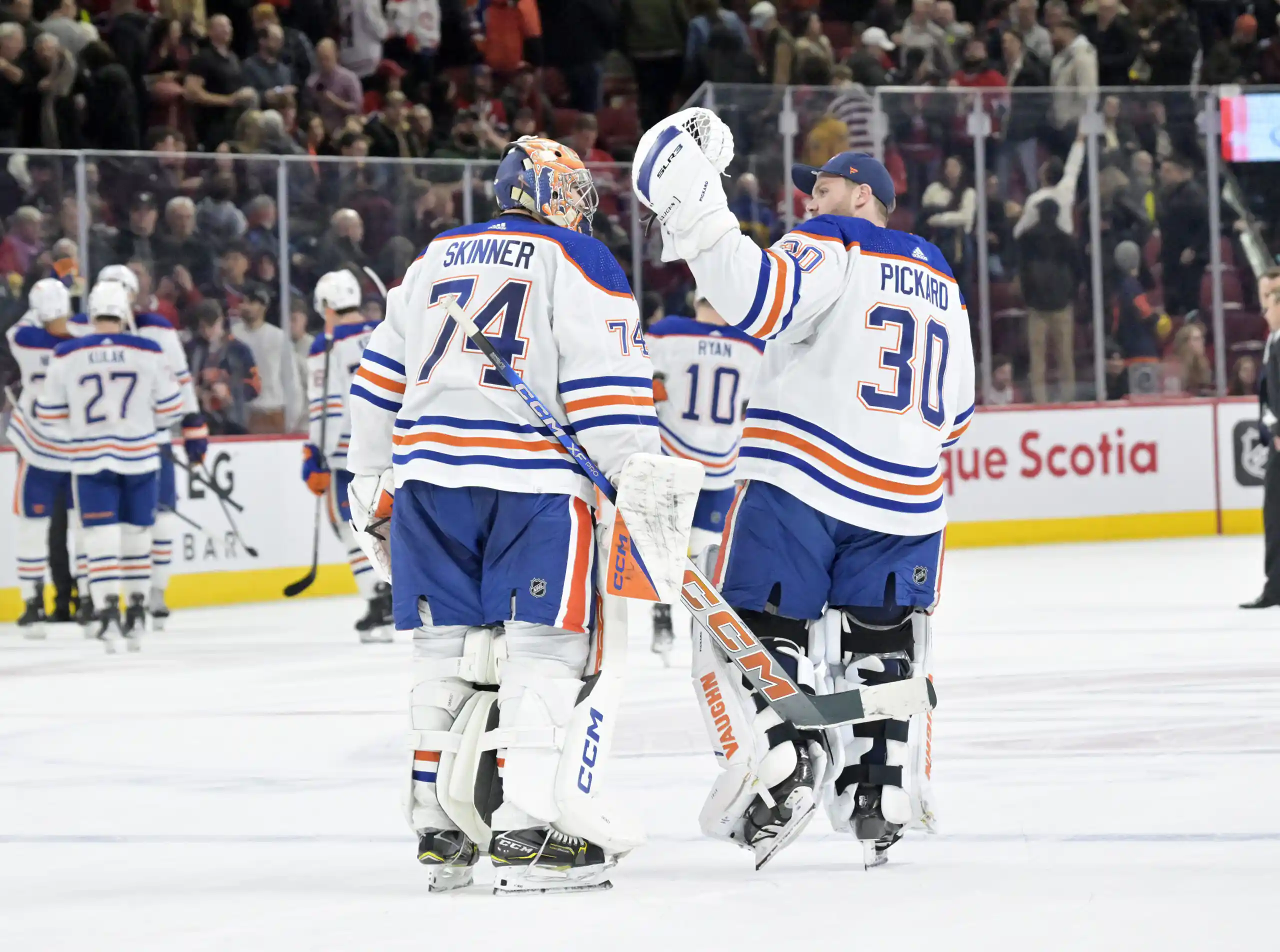Oilers have no unity
By Jason Gregor
9 years ago
The Oilers are in the midst of an eight-year playoff drought, soon to be nine.
They’ve already had losing streaks of five, four and six games and the season is only 21 games old. Things look very bleak.
They’ve already had losing streaks of five, four and six games and the season is only 21 games old. Things look very bleak.
Those stats illustrate a bad hockey club, regardless of what any analytics tell you, but for me the most disturbing sign from the Oilers hockey club came late in the second period of Saturday’s 7-1 drubbing by the Chicago Blackhawks.
Midway through the middle period, with the game already well out of reach, Keith Aulie hammered Ben Smith with a huge hit along the boards in Chicago’s zone. Within seconds two of Smith’s teammates, Johnny Oduya and Marcus Kruger, went after Aulie. Aulie tried to grab Oduya, but because Kruger was on him as well, he was unable to hit Oduya with any punches or even a face wash.
Kruger is tiny, but he didn’t hesitate for a moment to come to the aid of a teammate. The Hawks stand up for one another regardless of who delivers the hit. You don’t have to fight to be tough, but tough teams are willing to stand up for one another.
Fast forward five minutes.
Leon Draisaitl is behind the Chicago net and Michal Roszival crushes him from behind. It was a blatant cheap shot and a penalty. Remember the Oilers were trailing 6-0. The game was out of reach.
What did they do?
Absolutely nothing. NOTHING.
It was painful to watch, but in that moment you witnessed everything that is wrong with the Oilers. I don’t care what stats you throw out, the Oilers are not a good team, and what is even worse is that they are not a close team.
They don’t play for another. They don’t protect one another. They aren’t willing to do whatever it takes to win for each other. And when a team doesn’t have that, they are doomed.
The players have to be unified, even if the other team has more talent. If they don’t believe in each other and aren’t willing to defend one another this team will never win. They will never become competitive.
Taylor Hall is a great player, but to become a great leader he will need to urge and encourage his teammates to stand up for one another. He likely will have to lead by example in this regard. A great leader would have got in Roszival’s face. He would have stood up for the youngest player on the team. But Hall and Teddy Purcell did nothing.
They were within five feet of Roszival and they barely reacted.
Again, I’m not saying they have to fight him, but you need to show the Blackhawks you won’t back down or allow them to take liberties with your team. I was sitting in row five and I watched Keith Aulie take a stride from his point position, but when he saw none of the forwards were doing anything he stopped so the faceoff would stay in the offensive zone. Had Hall went after Roszival, Aulie would have been there right away, but the Oilers can’t always wait for the heavy, tough players to lead the charge.
Hall isn’t alone in this, far from it actually, but he is their best player and I believe his actions will create a foundation for the team.
Jonathon Toews does that for Chicago. He fought Joe Thornton once and afterwards said, “I felt it was something I needed to do to stand up for myself. ‘I did it, and I’m glad I did it.’’
Remember when Toews didn’t back down from Zdeno Chara in the Stanley Cup finals? He showed his team he wasn’t scared and that the Bruins couldn’t intimidate them.
I repeat, I’m not saying Hall has to fight guys, but he and Ryan Nugent-Hopkins need to set the tone for the team. They are the pulse of the team, and in a situation like Saturday night Hall cannot allow Roszival to get away with that hit, especially when the game was out of reach.
A MUCH BIGGER ISSUE
This is not the first time we’ve seen the Oilers stand idly by as other teams take liberties on their teammates. It has been an issue for the past five years. The odd time a player will take things into his own hands. Andrew Ference vs. Lee Stempniak, Nugent-Hopkins vs. Hamhuis and a few years ago Hall vs. Dorsett, but rarely will you see the Oilers act like a pack of wolves and go after an opposing player who wronged their teammate.
The scary part is that this lack of togetherness has infected the entire organization.
- The general manager tells the head coach he will have two NHL centremen to start the season. He doesn’t protect his coach with depth at the most important forward position on the team.
- The pro scouts don’t supply enough information to the GM so he won’t grossly overpay for Nikita Nikitin. If anything they could have at least convinced him to only sign Nikitin for one season.
- The coach doesn’t promote togetherness within the team. At the start of the season he talked about accountability. However, certain players are immune to it. No matter how bad Justin Schultz struggles, the coach won’t limit his icetime. I’m not saying you have to bench him, but at least don’t play him the most minutes game after game.
- Luke Gazdic is one of the most well-liked players in the room, yet the coach won’t put him in the lineup. I know he isn’t going to be a difference maker on the stats sheet, but the guys who are playing aren’t helping the team win. Sometimes you need to put a player in with the hope it sparks your team emotionally. The team had lost three, four and five in a row. It can’t always be about Xs and Os, sometimes you need to know the pulse of your dressing room.
WHAT NOW….
I’m not saying these subtle changes will magically cure all the problems of the Edmonton Oilers. It isn’t that simple, but the number one focus of the organization has to be building a cohesive and unified culture.
The players can say publicly that they care about each other, or that they will battle for each other, but actions speak louder than words, and the Oilers on-ice performance reeks of a team that lacks camaraderie.
There is no White Knight coming to save the Oilers.
Craig MacTavish could fire Dallas Eakins and he could make a trade or two, but those moves will not magically make the Oilers a more cohesive team.
This is about creating an identity, and right now the Oilers identity shows a divided group.
It won’t be an easy process.
There is no quick fix, but the leaders in that room have to recognize the problem and address it. If some players need to be weeded out of the room, then the players have to tell MacTavish who needs to go.
It is obvious the Oilers don’t have enough NHL talent to compete for a playoff spot right now, but there is no excuse for not playing hard or battling for your teammate.
Hall and Nugent-Hopkins are the two guys who need to change the attitude of that team. They have some solid character guys in Matt Hendricks, Boyd Gordon and Andrew Ference who should be able to help guide them, but until management provides them more talent, Hall and RNH must take charge and start changing the culture within the room.
It likely isn’t fair that this much pressure be put on their young shoulders, but I believe both of them are strong enough to handle it.
From 1997-2006 the Oilers used to have a foundation of hard work and desire.
They never had many superstar players, except for Chris Pronger, but their leaders demanded a strong work ethic. Doug Weight, Jason Smith, Ryan Smyth, Mike Grier, Steve Staios, Ethan Moreau, Fernando Pisani, Todd Marchant and Shawn Horcoff were rarely questioned about a lack of effort.
Outside of Weight, none of those other players had elite level skill, but they competed every shift and those teams stood up for one another.
The Oilers haven’t been a cohesive group since 2007.
It has slowly eroded away. Management traded away solid “glue guys” like Jarret Stoll and Matt Greene and they never replaced them. The organization allowed a rift to emerge between the young and experienced players.
As the cohesiveness slowly eroded away, the Oilers identity disappeared.
Now, in 2014, this team has no recognizable identity.
Another coaching change seems inevitable, but the coach doesn’t play the game. He can’t defend his players on the ice. He can’t make them want to play hard for each other.
He can give them a system to play. He can demand they work hard, but he can’t make them want to play for another.
That comes from within, and ultimately it is only the players who can change the culture and identity of their team.
The players need to play for one another and start forging a new identity.
If they don’t, then next November they will likely be in the exact same spot as they are now and have been for the past many years.
Recently by Jason Gregor:
Recent articles from Jason Gregor

